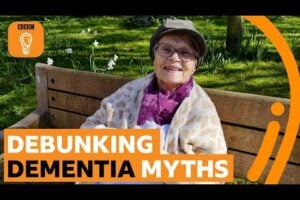
3D Models Explain Alzheimer’s Progression
Related:


Bill Gates on the Next Phase of the Alzheimer’s Fight

Dementia & Stroke

People with Dementia Debunk 5 Common Myths

What Starts Alzheimer’s, What Stops It?

It’s Not Alzheimer’s. It’s Just MCI.
Edited by:
P. Berger
This site was inspired by my Mom’s autoimmune dementia.
It is a place where we separate out the wheat from the chafe, the important articles & videos from each week’s river of news. Google gets a new post on Alzheimer’s or dementia every 7 minutes. That can overwhelm anyone looking for help. This site filters out, focuses on and offers only the best information. it has helped hundreds of thousands of people since it debuted in 2007. Thanks to our many subscribers for your supportive feedback.
The site is dedicated to all those preserving the dignity of the community of people living with dementia.
Peter Berger, Editor
Share this page To
Dementia Books & Videos on Amazon:
More From Alzheimer's Weekly

Beet Juice Increases Blood Flow to the Brain
DRINKING beet juice can increase blood flow to the brain in older adults. The way beet juice does this holds great potential for combating dementia.

Enhanced Light Sensitivity Contributes to “Sundowning” in Alzheimer’s
Alzheimer’s research from UVA Health suggests that enhanced light sensitivity may contribute to “sundowning” – the worsening of symptoms late in the day.

Understanding Amyloid Beta in Alzheimer’s
RESEARCH VIDEO + ARTICLE: Amyloid beta proteins can take on different formations when they group together, cauing neronal cell damage and inflamation. But it’s only

Diagnosis is Everything: Robin William’s Wife on His Lewy Body Dementia
A very personal and moving account of coping with the impacts of Lewy Body Dementia. Susan served on the board at the American Brain Foundation and is a prominent advocate for LBD and brain research.
This site was inspired by my Mom’s autoimmune dementia.
It is a place where we separate out the wheat from the chafe, the important articles & videos from each week’s river of news. Google gets a new post on Alzheimer’s or dementia every 7 minutes. That can overwhelm anyone looking for help. This site filters out, focuses on and offers only the best information. it has helped hundreds of thousands of people since it debuted in 2007. Thanks to our many subscribers for your supportive feedback.
The site is dedicated to all those preserving the dignity of the community of people living with dementia.
Peter Berger, Editor
Visit Alzheimer's Weekly On


Are these proteins similar to those causing BSE in cattle and could they be caused by these ?
Hi John,
BSE is caused by prions, which are misfolded proteins that are very different from the proteins described in this video. The Alzheimer's proteins in this video are beta-amyloid and tau proteins.
The video it is interesting and well made , but it video describes the LASTS STEPS of Alzheimer disease ,and do NOT talks about the FIRSTS STEPS of AD , that are the macro and microvascular brain disorders, the high peroxinitrites accumulation, the mitochondrial disorders in neurons and astrocytes ,the brain energy disorders , and at last the neuroinflammation,that in a sequence and simultaneous vicious circle of pathological disorders , preceeds in dozens of years the betamyloid , tau and oligomers disorders.
Research focused only in the lasts steps of AD (the betamyloid , tau and oligomers disorders) led to billions of dollars wasted in catasthrophic failures in the lasts 29 years of AD research.
We hope that researchers stops with that wastes , starting ,based in logical reasoning , with research to treat the firsts steps of AD.
Mr. Oliveira, (or is it Dr.?) You likely know very well that the brain resists the pick locks of researchers. It is the last frontier of medicine.
When ancient man removed a heart they could could easily discern its function as a pump, albeit without understanding the chemistry behind the pumping.
The functional anatomy and physiology of the brain is effectively impossible to decipher because it is immune to most all types of imaging and any attempts to perform in vivo studies and experimentation almost universally result in death. Unlike a computer hard drive, science does not yet even understand HOW a normal brain stores information as a part of its normal processes and gaining an understanding of the development of pathophysiology is still many decades away.
Another huge barrier is the inability to develop good animal models for research. I am sure you know the reason the beta-amyloid has been so focused on is because we have a mouse model that grows beta-amyloid. We have only recently developed a rat model that develops tau tangles. Outside of a human being, we still do not have a living experimental model that develops BOTH these AD related changes.
Imagine trying to study cancer where the tumors did not appear on x-rays and could not be grown in cultures. Imagine trying to cure cancer if the only place to test chemo-therapies was on living humans and then the results of those drugs could only be seen on autopsy. . . . This is what we are up against.
I want a cure as much as anyone but we dont yet have the basic understanding or tools to perform serious directed research.
Mr. Oliveira, Do you want to focus on an important change in research? Start by stamping out the word EARLY-ONSET Alzheimer's disease!
By using the word "early" the researchers have told the world that there is also an "on-time" for Alzheimers disease. They have inadvertently taught a generation of doctors that ALZ symptoms can occur only after age 65. Do you want the ALZ researchers to focus on the early changes? (when a cure might be possible) Then tell them to tear down the age barrier in AD. Only when researchers start to look for AD changes in people below the age of 65 will they find the earliest changes.
Mrm-mman (or it is a Dr?): thank you for your comments .
Only to clarify , I'm not a "Dr.". I'm only someone that try to uses the logical reasoning (as you ,I guess) , and NOT the " bigpharma logical" to read and to think about AD. As you knows better than me , the Early Onset Alzheimer Disease (EOAD – the presenilin 1 and presenlin 2 diseases , so called purely inherited or familial AD – responsible for only 2% to 5% of cases of AD ) , has a completely different cause or trigger or starter , from the different disease called Late Onset Alzheimer Disease (LOAD – responsible for 95% of cases of AD).)
Continuing :
As you know too ,the Late Onset Alzheimer disease (LOAD , the so called age-related dementia or sporadic AD) , it is NOT directly determined by some specific gene , despite APOE4 gene carriers have an increased chance to get AD , the APOE4 gene do NOT cause AD and it is not the starter of AD , and to be an APOE4 carrier do not means that the patient will have the age-related AD (the completely different disease from the Early onset AD). That information about the differences from Early Onset AD to Late Onset AD are pasted from the prestigeous american research site of AD called Fishers Center for Alzheimer's Research Foundation.
and it is absolutely according any scientific research site of USA and Europe.
About the Late Onset Alzheimer Disease (LOAD) research articles published in 2013 and 2014 are showing (as research articles in the lasts 29 years showed too) that the main triggers of the aging-related AD , are not the gene disorders and are not the betamyloid and tau accumulation , but the triggers of aging-related AD are the brain vascular disorders .
Please , take a look in the article in the prestigeous scientific american site Alzheimer Research Forum, where we can read an update article published in 04 april 2014 , with the title : "Can Arterial Health Predict Amyloid Deposition?' , where (according too the references articles in the bottom of the page of that site), betamyloid accumulation it is NOT the trigger of AD (but sometimes can only hastens the lasts stages ) , and proves and comproves that the MAIN triggers of the Late Onset AD (aging-related AD in elderly) are the macro and micro brain vascular disorders , and NOT the genes or the betamyloid and tau accumulation as can happens in the different disease called Early Onset AD. We can find it article of Alz Forum, searching in Google with the words : Alzheimer Research Forum , 04 april 2014 , Can Arterial Health Predict Amyloid Deposition?
As is described in the Fisher Center site, and as is described in ALL scientific books and sites of AD in all world (U.S.A., Europe,etc) and in the site of the american Alzheimer Association, the other disease , Ealy Onset AD and the Late Onset AD are DIFFERENT diseases , with different triggers or starters .
Then if in the Early Onset AD or the so called presenilin 1 and 2 diseases , that happens mainly in young persons, the MAIN starters are the presenilin 1 and 2 gene disorders, and if in the Late Onset AD (aging-related AD) that starts in patients after the 60's (mainly after the 80's) the MAIN starters are the macro and microvascular brain age-related disorders , and the betamyloid and tau accumulation in the Late Onset AD are NOT the triggers , how can researchers, if we use the logical reasoning, how can researchers wait to find the cure of Late Onset AD using the data of research to Early Onset AD ?
Once more , using the logical reasoning only , anyone ( doctors, caregivers ,relatives or any person) can understand, why , after 29 years of research based in the flawed betamyloid hypothesis , led to flaw over flaw in ALL research made until now, and it explains why that catastrophic failures in AD research with based in the flawed amyloid hypothesis , led to the billions of dollars wasted in the non sense hypothesis. Both diseases (Late Onset and Ealry Onset) , deserves specific research that the goals are the specific triggers.
I guess that you and me want that they find a way of research based in Logical Reasoning to the different types of AD .
Then the logical reasoning shows to you and to me , that the way it is NOT starting again with the same flawed hypothesis .
Differently that you proposed above, I guess that the logical reasoning looks to shows that researchers can do a type of research to treat specifically the Early Onset AD and another type of research to treat the specific Late Onset AD.
Best regards
Carlos
The exchange between Carlos and Mman seems to put AD research in perspective better than anything else I have read. I'm an engineer. I wouldn't know gray matter from muscle meat, but I do know PM (preventive maintenance) beats fixing things – hand down. Therefore, I side with logic and Carlos.
There are two ways to fund research – by government or industry. Government funded research is basically middle-class welfare. Starting from the bureaucrat appropriating funds to the PhDs working on the grants, they are in it to keep their jobs. If industry is footing the bill, profit is the driving force. No money – no work.
Back to logic – if there are thousands who would benefit from a cure there are millions who would benefit from prevention. There is no money in prevention and once there is prevention there is no more job. We're stuck.
Hi Brooks,
Money is not the problem. It sounds like you are in the USA, where the focus is on individual rights. In Japan, which is more "collective", I think corporations and insurance companies offer financial incentives to people who participate in prevention, such as being below a certain weight. That would not go over well with American's sensibilities regarding their individual rights, but it makes a lot of sense (and dollars) for insurance companies to pay good money to keep customers healthy so that customers make fewer medical-insurance claims.
But that may change with time. There are big problems, but things do seem to get better, albeit slowly at times. I'm hopeful.
I too appreciate the discussion between Carlos and MMan. I disagree with Brooks, however, about government funding and researchers.
Having known researchers… they tend to have a craving for more information, facts, logic… and accomplishment. If their research in one area succeeds to the extent that that focus of a problem seems to be solved, they’ll simply move on to other research. If some research actually comes up with solutions (which isn’t the only way of contributing to movement towards solutions), it will strengthen their position as researchers, vs. causing them to lose their jobs.
Admittedly, there are cultural and political differences between countries. We should learn from sharing the successes of each, rather than be set in our ways